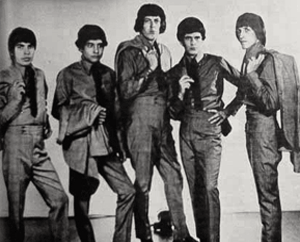|
Border Wave
''Border Wave'' is an album by the American band the Sir Douglas Quintet, released in 1981. Doug Sahm was inspired to record the album after the success of Joe Carrasco and Elvis Costello. It was Sahm's second album for Takoma Records. ''Border Wave'' peaked at No. 184 on the ''Billboard'' 200. The band supported the album with a North American tour. Production Recorded at Electric Lady Studios over five days, the album was coproduced by Craig Leon. Sahm was joined by original bandmembers Johnny Perez and Augie Meyers. Speedy Sparks played bass and Alvin Crow played guitar. " You're Gonna Miss Me" is a cover of the Roky Erickson song. "I Keep Wishing for You" was written by Butch Hancock. "Who'll Be the Next in Line" is a cover of the Kinks song. Critical reception ''The New York Times'' wrote that "Mr. Sahm and his cohorts, whether from age or their record production, sound older and heavier, too." Robert Christgau determined that "he handles horns better than most, but the qui ... [...More Info...] [...Related Items...] OR: [Wikipedia] [Google] [Baidu] |
Sir Douglas Quintet
The Sir Douglas Quintet was an American Rock music, rock band formed in San Antonio, Texas in 1964. With their first hits, they were acclaimed in their home state. When their career was established (subsequent to working with Texas record producer Huey Meaux), the band relocated to the West Coast. Their move coincided with the burgeoning San Francisco psychedelic rock scene of the mid 1960s to early 1970s. Overall, the quintet were exponents of good-times music with strong roots in blues and Texas-regional traditions. The band's songs were most noted for the instantly distinguishable organ sound of Augie Meyers' Vox Continental. Group's origins Doug Sahm, a veteran of the professional music scene who first sang on radio at the age of five, formed the Quintet (first called simply "Sir Douglas") in 1964 with longtime friend Augie Meyers and the other original members, Jack Barber, Frank Morin, and Johnny Perez. Sahm had started in country music and had played (at age eleven) on- ... [...More Info...] [...Related Items...] OR: [Wikipedia] [Google] [Baidu] |
Robert Christgau
Robert Thomas Christgau ( ; born April 18, 1942) is an American music journalist and essayist. Among the most influential music critics, he began his career in the late 1960s as one of the earliest professional rock critics and later became an early proponent of musical movements such as hip hop, riot grrrl, and the import of African popular music in the West. He was the chief music critic and senior editor for ''The Village Voice'' for 37 years, during which time he created and oversaw the annual Pazz & Jop critics poll. He has also covered popular music for '' Esquire'', '' Creem'', '' Newsday'', '' Playboy'', ''Rolling Stone'', '' Billboard'', NPR, '' Blender'', and '' MSN Music;'' he was a visiting arts teacher at New York University. CNN senior writer Jamie Allen has called Christgau "the E. F. Hutton of the music world—when he talks, people listen." Christgau is best known for his terse, letter-graded capsule album reviews, composed in a concentrated, fragmente ... [...More Info...] [...Related Items...] OR: [Wikipedia] [Google] [Baidu] |
Sir Douglas Quintet Albums
''Sir'' is a formal honorific address in English for men, derived from Sire in the High Middle Ages. Both are derived from the old French "" (Lord), brought to England by the French-speaking Normans, and which now exist in French only as part of "", with the equivalent "My Lord" in English. Traditionally, as governed by law and custom, Sir is used for men who are knights and belong to certain orders of chivalry, as well as later applied to baronets and other offices. As the female equivalent for knighthood is damehood, the ''suo jure'' female equivalent term is typically Dame. The wife of a knight or baronet tends to be addressed as Lady, although a few exceptions and interchanges of these uses exist. Additionally, since the late modern period, Sir has been used as a respectful way to address a man of superior social status or military rank. Equivalent terms of address for women are Madam (shortened to Ma'am), in addition to social honorifics such as Mrs, Ms, or Miss. Etymo ... [...More Info...] [...Related Items...] OR: [Wikipedia] [Google] [Baidu] |

